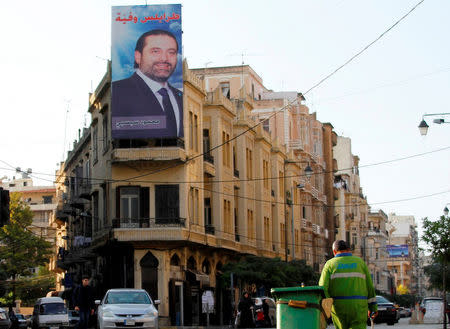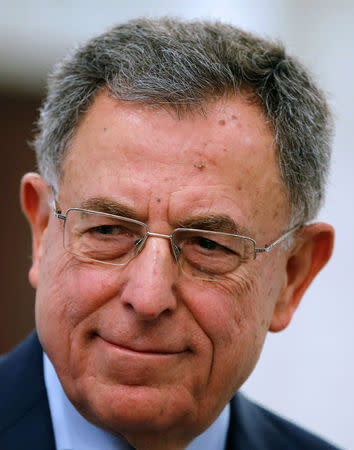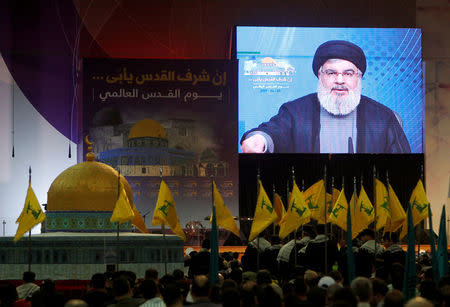Lebanon's Hariri visits UAE as home crisis escalates
By Angus McDowall BEIRUT (Reuters) - Lebanon's outgoing prime minister, Saad al-Hariri, made a brief visit to the United Arab Emirates from Saudi Arabia on Tuesday despite a deepening crisis back home and a rise in regional tensions triggered by his surprise resignation. Hariri announced his resignation on Saturday during a visit to his ally Saudi Arabia and has not yet returned to Lebanon. He said he believed there was an assassination plot against him and accused Iran, Saudi Arabia's arch-rival, and its Lebanese ally Hezbollah of sowing strife in the Arab world. His resignation has thrust Lebanon back into the frontline of the regional rivalry that pits a mostly Sunni bloc led by Saudi Arabia and allied Gulf monarchies against Shi'ite Iran and its allies. Hariri's office said he had flown to Abu Dhabi on Tuesday and then returned to Riyadh, but it gave no reason for the trip. It also did not say when he would return home. Hariri's Future TV channel said he would also visit Bahrain but gave no reason. Hezbollah has accused Riyadh of forcing Hariri to resign. Riyadh and aides to the Lebanese leader, whose family made their fortune in the Saudi construction industry, have strongly denied reports that he has been detained or was forced to quit. On Monday Riyadh accused Lebanon of declaring war against it because of aggression by Hezbollah, dramatically escalating the crisis and threatening to destabilize Lebanon. On Tuesday Lebanese politicians and Hezbollah remained silent about the escalation in Saudi rhetoric after a series of consultations with President Michel Aoun, a Hezbollah ally. A rocket fired from Yemen was intercepted on the outskirts of Riyadh hours after Hariri's resignation on Saturday. On Monday, Saudi Foreign Minister Adel al-Jubeir told CNN the rocket "was an Iranian missile launched by Hezbollah". Iranian President Hassan Rouhani called Aoun on Tuesday to discuss developments, telling him that unity among the Lebanese people would ensure that external strife and regional problems could be overcome, Iran's state news agency IRNA reported. "Iran will do all it can to bolster the stability of Lebanon," IRNA quoted Rouhani as saying. UNCERTAINTY Hariri's resignation has triggered the collapse of a national unity government agreed last year in a political deal that united Lebanon's opposing sides. This had led to Lebanon's first budget since 2005 and to agreement on a new law for a parliamentary election, which could now get derailed. Aoun has said he will not accept Hariri's resignation until he returns to Lebanon to explain his thinking -- a move widely seen as a stalling tactic. Hezbollah and its allies will struggle to form a government without Hariri or his blessing. The post of prime minister must be filled by a member of Lebanon's Sunni community, among which he is the most influential politician. The pro-Hezbollah al-Akhbar daily reported on Tuesday that Hariri "was placed under house arrest hours after arriving in Riyadh last Friday", that a Saudi security team was supervising his movements and that he had only limited access to his phones. Fouad Siniora, a former prime minister and member of Hariri's Future Movement, said he had spoken to him on Monday and added that Hariri would return to Lebanon. The political crisis has alarmed investors. On Tuesday Lebanon's dollar bonds fell and the cost of insuring exposure to its debt reached its highest since late 2008, and Moody's ratings agency warned of damage to its credit rating. Five-year credit default swaps (CDS) for Lebanon jumped 51 basis points from Monday's close to 588 bps, according to IHS Markit data. Lebanon's 2022 issue dollar bond fell 3.4 cents to 92 cents in the dollar, trading at its lowest ever level, Thomson Reuters data showed. The finance minister, central bank governor and head of the banking association all issued statements on Monday stressing Lebanon's financial and monetary stability. (Reporting by Angus McDowall, Ellen Francis, Tom Perry, Lisa Barrington and Sarah Dadouch, Additional Reporting by Bozorgmehr Sharafedin, Editing by Gareth Jones)







